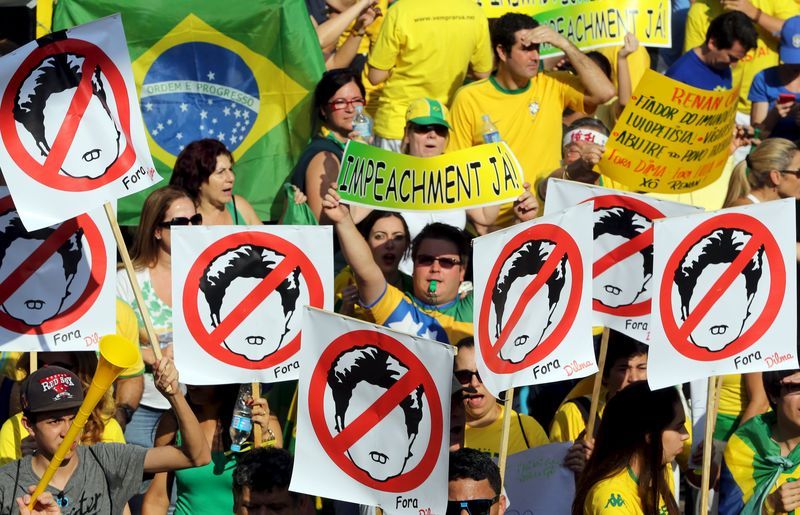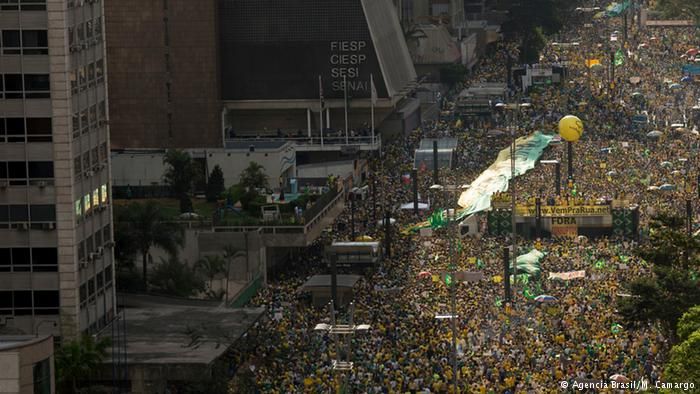 Hundreds of thousands of demonstrators returned to the streets in dozens of Brazilian cities on Sunday to call for the impeachment of President Dilma Rousseff, blaming her for a vast corruption scandal and the economy's worst slump in a quarter century.
Hundreds of thousands of demonstrators returned to the streets in dozens of Brazilian cities on Sunday to call for the impeachment of President Dilma Rousseff, blaming her for a vast corruption scandal and the economy's worst slump in a quarter century.
Less than a year into her tumultuous second term, the left-wing president's approval rating has dwindled to single digits and polls show that two in three Brazilians support calls for her impeachment.
In the third wave of demonstrations against Rousseff this year, protesters convened by social media across Latin America's largest country created a festive family atmosphere and chanted “Out with Dilma!"
About 135,000 people swarmed Sao Paulo's financial district, according to pollster Datafolha, and 25,000 assembled in front of Congress in Brasilia, according to police. Both numbers were roughly in line with similar protests in April but more modest than turnout in March.
A government spokesman said in a statement that the demonstrations were a “normal part of democracy."
There is widespread support for the protest movement as rising unemployment and inflation presage the worst economic downturn since at least 1990. Government austerity efforts meant to keep Brazil's investment-grade credit rating have turned off even Rousseff's supporters and met resistance from lawmakers.
“We hear all about budget cuts, but so far it's only hurting people like me," said Francisco Mosack, a retired metalworker from the humble Sao Paulo neighbourhood of Capao Redondo, who complained that his electric bill had nearly doubled in a year.

“I'm coming out to show my indignation … But I don't trust those lawmakers either. It's hard to see how things are going to get better," said Mosack, 65, wearing the canary yellow jersey of Brazil's national football team as he joined a sea of green and yellow along Sao Paulo's Avenida Paulista.
With the political opposition divided and Congress in disarray, protesters had few proposals to rally around except for the removal of Rousseff. If she were impeached, as many demanded, the next in line would be Vice-President Michel Temer, who is from another party, but coordinates her legislative agenda.
A 17-month-old bribery and money-laundering investigation is rattling the government and state-run companies at the heart of the Brazilian economy but has revealed no evidence against the president.
Rousseff's critics in Congress have seized on claims that she doctored public accounts last year to open the door to impeachment, but an audit court this week gave her more time to respond to the allegations.
POOREST TURN ON PRESIDENT
A Datafolha survey this month showed impeachment has the most support among the poorest and least educated Brazilians, who overwhelmingly backed Rousseff in her narrow re-election victory last October.
“Everyone is fed up, but they don't know what to do about it," said Renato Meirelles, head of research firm Data Popular, which surveys Brazil's middle and lower classes.
Sensing weakness, congressional leaders have sabotaged much of the president's economic agenda. The leader of the lower house of Congress, who is responsible for moving ahead with an impeachment vote, broke entirely with her government last month.
The president had measured success this week consolidating support among restive Senate leaders for a pro-business agenda. But their backing remains fragile.
Further muddying the waters, a bribery and money-laundering investigation that started with state-run oil company Petrobras has spilled into the political realm as the prosecutor-general readies charges against sitting politicians.
Brazil's biggest-ever corruption scandal already landed several of the country's most prominent executives in jail, and plea deals have implicated congressional leaders and senior members of Rousseff's government.
No evidence has emerged incriminating Rousseff, but many protesters consider her responsible for wrongdoing at Petrobras, where she was chairwoman from 2003 to 2010.
After police arrested the treasurer of the ruling Workers' Party in April and another senior party member this month, several demonstrators suggested Rousseff's predecessor and political mentor Luiz Inacio Lula da Silva would be next.
Both Rousseff and Lula have vehemently denied any role in the alleged graft.
At the protest in Brasilia, demonstrators inflated an enormous caricature of the former president, once one of the world's most popular politicians, in black and white prison garb with a ball and chain around his ankle.
Source: euronews
 В Атырау -10
В Атырау -10